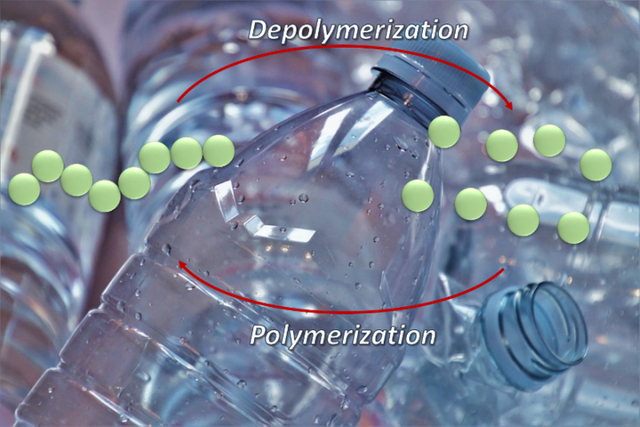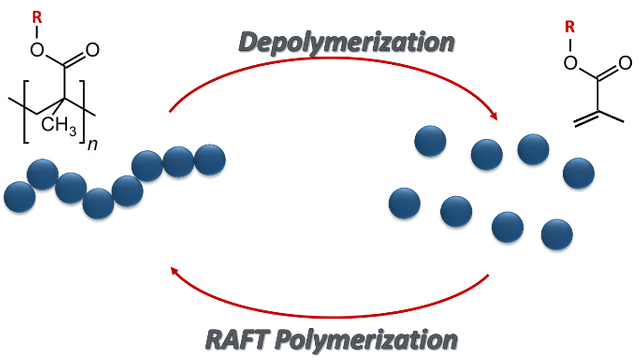First step towards more effective plastic recycling
The plastics industry already has a long history of producing various types of polymers, those large molecules that are made up of smaller units called monomers, which are joined together by covalent bonds forming long chains of high molecular weight, examples of which are materials such as polyethylene, polypropylene, polystyrene and polyurethane, among others, being today the different synthetic polymers the basis of all kinds of plastic materials.

One option for recycling plastics is the recovery of monomers. Source: @emiliomoron, contains a public domain image.
However, although the formation of these macromolecules through polymerization, which is basically assembling a long chain through the repetition of simple molecular units, is quite well known and has been very well investigated, giving us the large number of plastic materials that we know; The truth is that performing the reverse process and separating these macromolecules into their individual units or blocks, a process called depolymerization, has been little studied, so there is no efficient method to recover these individual building blocks, or monomers.

Example of the polymerization of styrene. Source: image made in powerpoint .
Certainly there are several reasons why scientists have not paid much attention to the depolymerization process, on the one hand it is an extremely complex process to break the chains that bind the monomers, since it depends on the type of compound and the process used in its manufacture, In addition to the fact that this reverse process requires much more energy than that used in the manufacture of the starting compound, and current processes provide lower quality products, making it only usable in lower value products, which has led to the exploration of this option is economically unfeasible.
But a team of polymer materials researchers at ETH Zurich has managed to break down polymers into their individual components and recover more than 90% of them, which would be an important step on the way to a true plastics recycling method. The results of the study have just been published in the Journal of the American Chemical Societycall_made, and in said study, this team reports having achieved a catalyst-free depolymerization of several linear polymethacrylates, decomposing almost 92% of them into their constituent monomers, being able to be recycled to be used in other applications.

The new method allows the depolymerization of the monomers and their polymerization again. Source: image made in powerpoint .
The polymers that were broken down were produced by a new polymerization technique called reversible addition fragmentation chain transfer (RAFT) polymerization, a method that is attracting much interest in the industry as it produces polymer chains with a uniform length, and through this method, this group of researchers managed to locate radicals at the end of the polymerization chain, which allowed depolymerization to be triggered.
The advantage of this new method is that the recovered monomers can be used to reconstruct the same polymer from which they were obtained or an insoluble gel that can also be subjected to depolymerization, and the products created from these have the same characteristics as the original ones. .
Although much more research is still needed to develop the method and scale it to an industrial level, it already offers some hope in the search for solutions for plastic pollution, even this would be a long-term solution, since it would be a way to recover the polymer monomers manufactured in this way, not being used for the amount of plastic waste that already pollutes our environment. But we must bear in mind that these are the first steps towards the production of truly recyclable plastics, compared to the number of studies that have only addressed polymerization methods without contemplating the reverse process to recover these materials.
Thanks for coming by to read friends, I hope you liked the information. See you next time.

Wow what a great research. This will go a long way in the development of plastic industries.
We need to encourage the habit of recycling because there is a lot of benefit in it.
It enables the growth of an economy and also helps in the management of resources.
Thanks for sharing this great post with love from @hardaeborla and I hope you have a great day ahead 💞💞
Hello friend, that's right, this type of development is necessary to promote a more sustainable economy of plastic products. Thank you for reading!
You're welcome buddy ❤️💕
Plastic recycling is very much needed in the Today's generation if you don't recycle plastic it will create huge environmental consicounse in the future.
The earth is already facing global warming it will increase more by the use of plastic.
That's right friend, the problem of plastic pollution is already too big to ignore, other production methods are required to solve this problem.
plastic recycling is much needed to have a great and positive impact in our planet and I think that this must be adopted by each country for a better world.
We certainly urgently need more effective methods for recycling plastics.
@tipu curate 2
Upvoted 👌 (Mana: 4/6) Get profit votes with @tipU :)
Thank you very much my friend!
It is really wonderful that the chemical industry is aiming for real solutions to pollution, especially the use of polymers, and this is something we must change as a whole if we want to have a few more years of life on the planet. It is really very interesting the approach of molecular decomposition. Thanks for sharing.
Hello @emimoron, it is an important change of approach that the industry must adopt, something that promotes the recovery of plastic to generate less waste.
Hello @emiliomoron, the content you have created is not steemexclusive as you have posted it outside steemit 👇
https://stemgeeks.net/hive-163521/@emiliomoron/first-step-towards-more-effective-plastic-recycling
Hello friend @jimah1k, that's right, that's why I haven't used the steemexclusive tag